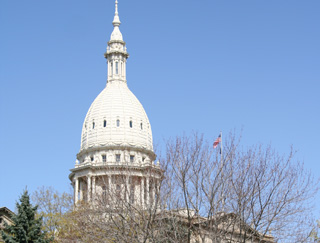 This morning the Governor presented his Fiscal Year 2015 Budget to a joint meeting of the House and Senate Appropriations Committee. The budget will include a 3 percent increase in funding to the Economic Vitality Incentive Program (EVIP), as well as a 12 percent infusion into a new EVIP line item that eligible communities can tap into, an increase that totals $36 million. Constitutional revenue sharing has also increased by 3 percent totaling $19.4 million. This means there will be an additional $55.4 million coming to cities, villages and townships through these increases. You can view the entire executive recommendation on the State Budget Office’s website (EVIP begins on page 83).
This morning the Governor presented his Fiscal Year 2015 Budget to a joint meeting of the House and Senate Appropriations Committee. The budget will include a 3 percent increase in funding to the Economic Vitality Incentive Program (EVIP), as well as a 12 percent infusion into a new EVIP line item that eligible communities can tap into, an increase that totals $36 million. Constitutional revenue sharing has also increased by 3 percent totaling $19.4 million. This means there will be an additional $55.4 million coming to cities, villages and townships through these increases. You can view the entire executive recommendation on the State Budget Office’s website (EVIP begins on page 83).
Unfortunately, while we hope this means there is recognition of the importance of reinvesting in communities, the Governor and Legislature have cut funding by more than $6 billion in the last decade. Our municipal finance system is broken, and we will not be able to create prosperous communities without addressing this critical issue.
In addition, there are still significant problems with the EVIP program. Governor Snyder proposes creating a “gold standard” for communities who meet certain criteria. The exact language was not made available, but it could include criteria like high credit ratings and low unfunded liabilities. Communities who meet the “gold standard” would not have to comply with EVIP.
The Governor is also proposing an additional $28.8 million in EVIP for which eligible communities can qualify. It is population based; however, communities who qualify for EVIP would be eligible for this funding if they meet certain criteria that would bump their population numbers by 10 percent for each one they meet.
 The criteria are: the “gold standard”; if a community is in the top 25 percent for violent crime; if a community is in the top 25 percent of unemployment or if a community has submitted an approved deficit elimination plan to the Department of Treasury. These new criteria are in addition to EVIP, and frankly they are very confusing. We will be working to make eliminate the current burdensome EVIP criteria, and that will certainly include not adding additional confusing criteria to the mix.
The criteria are: the “gold standard”; if a community is in the top 25 percent for violent crime; if a community is in the top 25 percent of unemployment or if a community has submitted an approved deficit elimination plan to the Department of Treasury. These new criteria are in addition to EVIP, and frankly they are very confusing. We will be working to make eliminate the current burdensome EVIP criteria, and that will certainly include not adding additional confusing criteria to the mix.
There is no recommendation that we increase transportation funding which is obviously problematic for our local transportation systems. The League has released a statement on the budget that thanks the Governor for recommending an increase in spending but calls on him to address our broken municipal finance system and increase money for transportation.
We look forward to working on both the general government and transportation budgets as hearings start in the coming weeks.
Samantha Harkins is the Director of State Affairs for the Michigan Municipal League. She can be reached at 517-908-0306 or email at sharkins@mml.org




